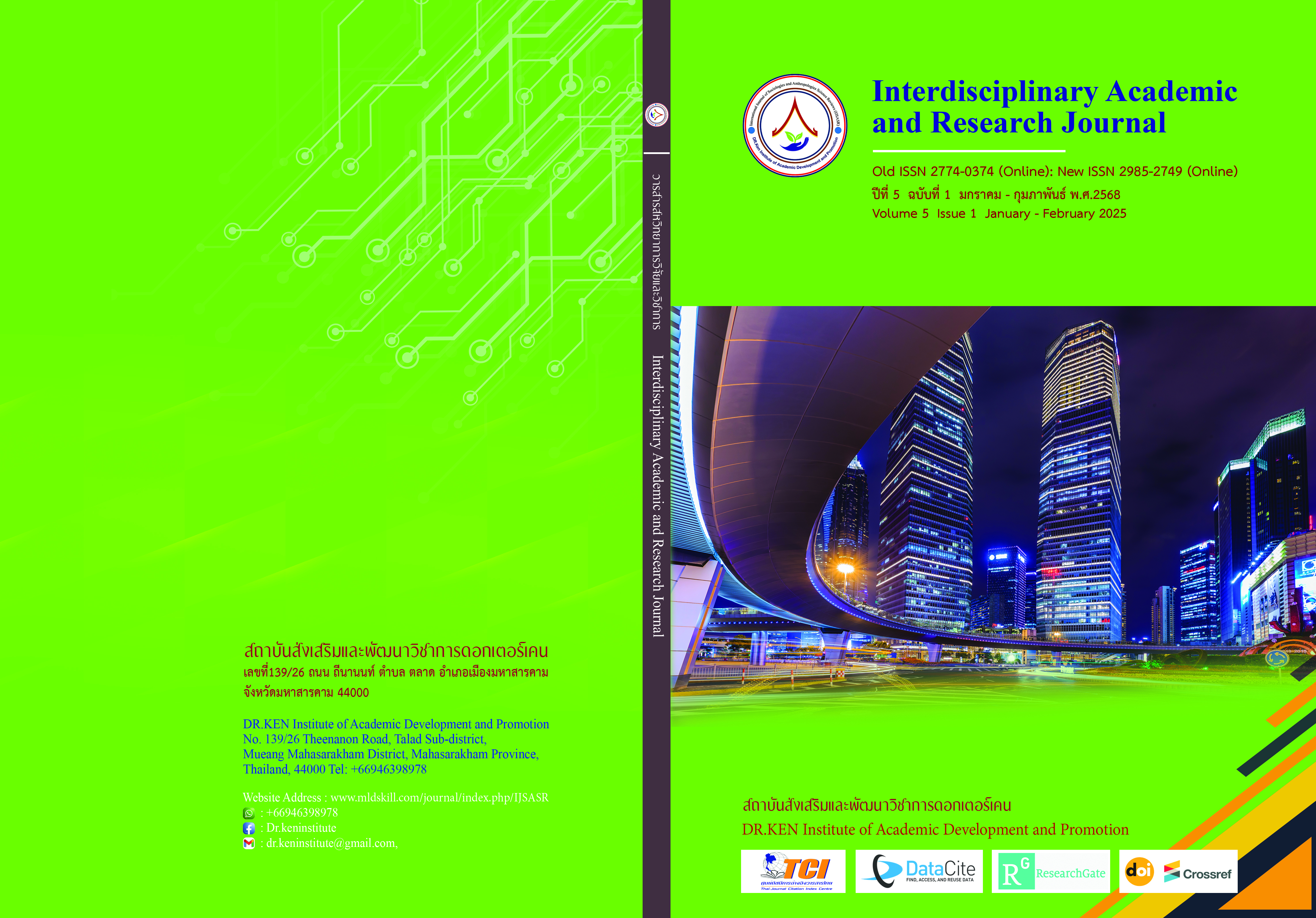The Development Model for Educational Quality Development Under the Office of the Primary Educational Service Area in the North Eastern Area
DOI:
https://doi.org/10.60027/iarj.2025.280920Keywords:
Model, Development, Quality of education, EducationAbstract
Background and Aims: School Management Model for Educational Quality Development School Management Model for Educational Quality Development under the Office of the Primary Educational Service Area To be used in developing educational quality and promoting teaching and learning management for teachers To be of maximum benefit to students. This research aims to (1) Study the components and indicators of school management for educational quality development. (2) Study the current and desired conditions and the necessary conditions of school management for educational quality development. (3) Design, create and develop a school management model for educational quality development. And (4) Study the results of using school management models for educational quality development. This study studied schools under the Office of the Primary Educational Service Area, Northeastern Region
Methodology : This research is an action research. The informants consisted of 5 experts who were purposively selected, including school principals, deputy principals, department heads, and teachers. The sample consisted of 380 school principals and 380 department heads, totaling 760 people. The research instruments consisted of: the appropriateness assessment form of components and indicators, the assessment form for experts, the questionnaire on current and desired conditions, the interview form for schools with good practices, the appropriateness and feasibility assessment, and the outcome assessment form according to the management model.
The statistical methods used were the mean, standard deviation, and the index of importance for data analysis.
Results: The study of the components and indicators of school management for the development of educational quality discovered that there were 8 components and 17 indicators, with the overall appropriateness assessment ranking highest. The study of current and desired conditions, including the need for improvement, revealed that overall current conditions were excellent. The school management model's design, creation, and development revealed that its overall appropriateness, feasibility, and utility were all at the highest levels. The study of the impact of the management model revealed that: (1) A comparison of knowledge and understanding before and after development revealed that the knowledge score after training was significantly higher than before training at a statistical level of 0.05. And (2) The evaluation of the results based on the school management model for the development of educational quality revealed that the overall level before using this model was moderate.
Conclusion: The study's findings concluded that educational institutions' management models can help to improve education quality. The management model of educational institutions to improve educational quality under the Office of the Primary Education Area resulted in the appointment of school directors, deputy directors, department heads, and teachers. The sample group consisted of administrators who were continuously trained to be ready to carry out activities aimed at improving student quality.
References
กานต์ธีรา ภูริวิกรัย. (2564). การศึกษาโลกในศตวรรษที่ 21 : ระบบยังเหลื่อมล้ำ การเรียนรู้ยังวิกฤต. Retrieved from: https://www.eef.or.th/global-education/.
จรัญ น่วมมะโน. (2562). การพัฒนารูปแบบการนิเทศภายในเพื่อพัฒนาสมรรถนะครูในการจัดการเรียนรู้ภาษาอังกฤษสำหรับโรงเรียนมัธยมศึกษาในภาคตะวันออกเฉียงเหนือ. วิทยานิพนธ์การศึกษาดุษฎีบัณฑิต สาขาวิชาการนิเทศการศึกษา บัณฑิตวิทยาลัย: มหาวิทยาลัยมหาสารคาม.
ทัศนีย์ รัตนสุวรรณ. (2560). การพัฒนารูปแบบการบริหารงานของสถานศึกษาเอกชนขั้นพื้นฐานที่มีประสิทธิผล. ปริญญานิพนธ์ปริญญาดุษฎีบัณฑิต: มหาวิทยาลัยราชภัฎนครศรีธรรมราช.
ธีระ รุญเจริญ. (2553). ความเป็นมืออาชีพในการจัดและบริหารการศึกษายุคปฏิรูปการศึกษา (ฉบับปรับปรุง) เพื่อปฏิรูปรอบสองและประเมินภายนอกรอบสาม. กรุงเทพฯ : ข้าวฟ่าง.
นพพงษ์ บุญจิตราดุลย์. (2557). หลักการและทฤษฎีการบริหารการศึกษา. กรุงเทพฯ: ตีรณสาร.
บุญชม ศรีสะอาด. (2553). การวิจัยเบื้องต้น. (พิมพ์ครั้งที่ 8). กรุงเทพฯ : สุวีริยาสาส์น.
วินุลาศ เจริญชัย. (2562). การพัฒนารูปแบบการบริหารจัดการองค์การสมรรถนะสูงเพื่อพัฒนาคุณภาพ การศึกษาในสถานศึกษา สังกัดองค์การบริหารส่วนจังหวัด. วิทยานิพนธ์ปริญญาการศึกษาดุษฎีบัณฑิต มหาวิทยาลัยมหาสารคาม.
วิโรจน์ สารรัตนะ. (2542). การบริหาร หลักการ ทฤษฎี และประเด็นทางการศึกษา. กรุงเทพฯ : ทิพย์วิสุทธิ์.
ศุภลักษณ์ เศษธะพานิช. (2550). การพัฒนาระบบการบริหารที่มุ่งเน้นความเป็นเลิศของสถานศึกษาเอกชน.วิทยานิพนธ์ครุศาสตรดุษฎีบัณฑิต สาขาบริหารการศึกษาบัณฑิตวิทยาลัย: จุฬาลงกรณ์มหาวิทยาลัย
สมกิต บุญยะโพธิ์. (2555). รูปแบบการบริหารสถานศึกษาขั้นพื้นฐานสังกัดสำนักงานเขตพื้นที่การศึกษาประถมศึกษาสู่ความเป็นเลิศ. ดุษฎีนิพนธ์ปรัชญาดุษฎีบัณฑิต ปร.ด. (การบริหารการศึกษา) นครปฐม: บัณฑิตวิทยาลัย มหาวิทยาลัยศิลปากร
สันวิช แก้วมี. (2561). การบริหารสู่ความเป็นเลิศของโรงเรียนเอกชนสอนศาสนาอิสลาม สังกัดสํานักงานคณะกรรมการการส่งเสริมการศึกษาเอกชนในทศวรรษหน้า. วิทยานิพนธ์ตามหลักสูตรปริญญาครุศาสตรดุษฎีบัณฑิต : มหาวิทยาลัยราชภัฏวไลยอลงกรณ์ ในพระบรมราชูปถัมภ์จังหวัดปทุมธานี
สำนักงานเลขาธิการสภาการศึกษา. (2560). การศึกษาไทยในยุคโลกาภิวัตน์: สู่ความก้าวหน้าและความมั่นคงของชาติในศตวรรษ. กรุงเทพฯ: โรงพิมพ์ครุสภาลาดพร้าว, 2551.
สุธรรม ธรรมทัศนานนท์. (2554). หลักการ ทฤษฎีและนวัตกรรมการบริหารการศึกษา. มหาสารคาม : โรงพิมพ์สารคามคามการพิมพ์.
สุพริศร์ สุวรรณิก. (2564). โลกจะเปลี่ยนไปอย่างไรหลังวิกฤตโควิด-19 จบลง. กรุงเทพฯ: ฝ่ายเศรษฐกิจมหัพภาคธนาคารแห่งประเทศไทย.
สุพิศ โสภา. (2560). การบริหารสถานศึกษาสู่ความเป็นเลิศของโรงเรียนขนาดกลางสังกัด ส านักงานเขตพื้นที่การศึกษา มัธยมศึกษาเขต 25 จังหวัดขอนแก่น: กรณีศึกษา โรงเรียน แวงใหญ่วิทยาคม. วารสารวิทยาลัยบัณฑิตเอเชีย. 7(2), 84-94
อภิชญา สังกะคำ และธรินทร นามวรรณ. (2564). แนวทางการพัฒนาการบริหารวิชาการสู่การเป็นโรงเรียนคุณภาพ สังกัดสำนักงานเขตพื้นที่การศึกษาประถมศึกษากาฬสินธุ์ เขต 1. วารสารพุทธปรัชญาวิวัฒน์, 5(2), 95-101.
เอกธิป สุขวารี. (2554). ยุทธศาสตร์การพัฒนาระบบประกันคุณภาพภายในเพื่อการดำเนินการที่เป็นเลิศสำหรับสถาบันอุดมศึกษา. วิทยานิพนธ์ (สาขาวิชาบริหารการศึกษา): จุฬาลงกรณ์มหาวิทยาลัย.
Austin, G.E., Reynolds, D. (1990). Managing for improved school effectiveness: An international survey. School Organization, 10 (3), 167 – 178.
Baskett, S., & Miklos, E. (1992). Perspectivesof effective principals. The Canadian. Administrator, 32(1), 1-10.
Bawany, S. (2018). Leading in a disruptive VUCA world. New York: Business Expert Press.
Sergiovanni, T.J. (1998). Leadership as Pedagogy, Capital Development and School Effectiveness. International Journal of Leadership in Education, 1(1), 37-46.
Downloads
Published
How to Cite
Issue
Section
License
Copyright (c) 2025 Interdisciplinary Academic and Research Journal

This work is licensed under a Creative Commons Attribution-NonCommercial-NoDerivatives 4.0 International License.
Copyright on any article in the Interdisciplinary Academic and Research Journal is retained by the author(s) under the under the Creative Commons Attribution-NonCommercial-NoDerivatives 4.0 International License. Permission to use text, content, images, etc. of publication. Any user to read, download, copy, distribute, print, search, or link to the full texts of articles, crawl them for indexing, pass them as data to software, or use them for any other lawful purpose. But do not use it for commercial use or with the intent to benefit any business.
















.png)


